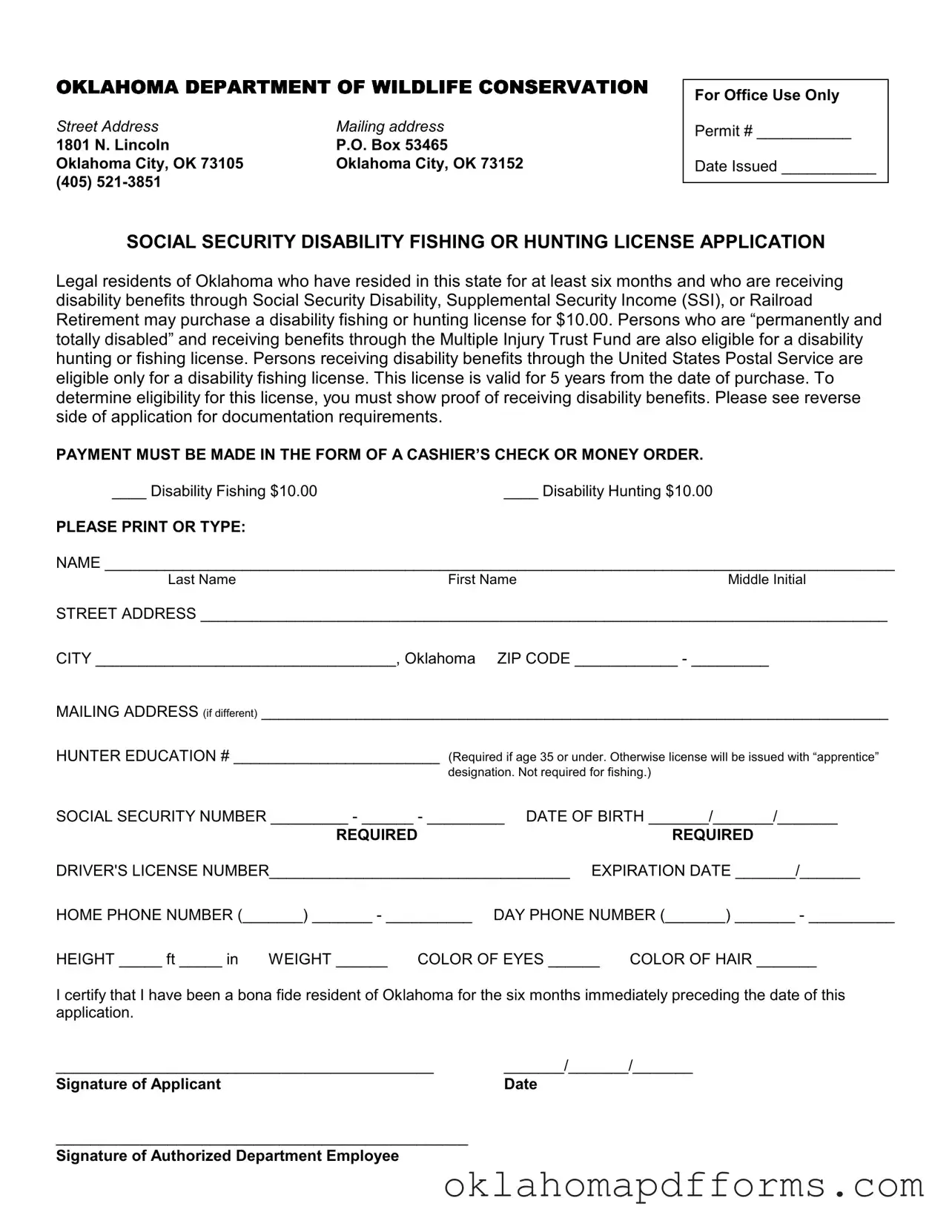The Oklahoma Fishing License Application form shares similarities with the hunting license application, which is essential for those who wish to hunt legally in the state. Both documents require personal information such as name, address, and date of birth. Additionally, they often ask for proof of residency and may include questions about prior licenses held. Both applications aim to ensure that individuals are aware of and comply with state regulations regarding wildlife conservation and safety. The process for obtaining either license can also include fees and specific eligibility criteria.
Another document that resembles the Oklahoma Fishing License Application is the state park pass application. Like the fishing license, this form requires personal identification and residency verification. Both applications are designed to regulate access to state resources and ensure that users are contributing to the maintenance and conservation of these areas. Fees are typically involved, and both documents often include a section for emergency contact information, emphasizing safety in outdoor activities.
The boating registration application is also similar in structure and purpose. This document requires information about the boat owner, including their name and address, much like the fishing license application. Both forms serve to register individuals for recreational activities that involve state oversight. Additionally, they promote safety by ensuring that boaters are aware of regulations and requirements, such as safety equipment and registration fees.
As with the various forms related to recreational activities in Oklahoma, understanding the legal implications of ownership is critical, particularly with documents like the Trailer Bill of Sale form. This form is essential for ensuring that the transfer of trailer ownership is recognized; without it, the sale may lead to ambiguities. To learn more about such important documentation, you can visit UsaLawDocs.com for resources and guidance.
The wildlife conservation permit application shares many features with the fishing license application. Both documents require personal details and often include a section for previous permits or licenses held. They aim to promote responsible wildlife management and conservation efforts. By obtaining either permit, individuals agree to adhere to specific regulations that help protect the environment and maintain sustainable wildlife populations.
Similarly, the camping permit application is akin to the fishing license application. Both forms require personal information and may ask for details about the intended activities, such as the type of camping or fishing planned. They both serve as a means to manage the use of state resources and ensure that participants are aware of the rules and regulations governing their activities. Fees are typically associated with both permits, reinforcing the importance of funding for conservation efforts.
The snowmobile registration application also mirrors the fishing license application in its approach to regulating recreational activities. Personal identification is required, along with information about the snowmobile itself. Both applications focus on safety and compliance with state laws. By registering their snowmobiles, owners contribute to the maintenance of trails and other resources, similar to the contributions made by fishing license holders to aquatic conservation.
The ATV (All-Terrain Vehicle) registration application is another document similar to the fishing license application. Both require applicants to provide personal information and details about the vehicle being registered. These applications help ensure that operators are aware of safety regulations and responsible riding practices. Additionally, both types of registration contribute to the funding of trail maintenance and safety initiatives in their respective areas.
The hunting and fishing combination license application is a direct parallel to the fishing license application. This document combines the requirements of both hunting and fishing licenses into one application. Individuals must provide similar personal information and may be subject to the same fees. The combination license promotes responsible use of natural resources by ensuring that individuals are educated about regulations governing both activities.
The state wildlife management area access permit application shares commonalities with the fishing license application as well. Both require personal information and often include questions about previous permits held. These applications aim to regulate access to specific areas designated for wildlife conservation and recreation. By obtaining these permits, individuals agree to follow regulations that protect both wildlife and natural habitats.
Finally, the environmental impact assessment application can be viewed as similar to the fishing license application in terms of its overarching goal of conservation. While the fishing license focuses on individual recreational activities, the environmental impact assessment seeks to evaluate the effects of proposed projects on ecosystems. Both documents underscore the importance of responsible stewardship of natural resources, promoting awareness and compliance with regulations designed to protect the environment.


